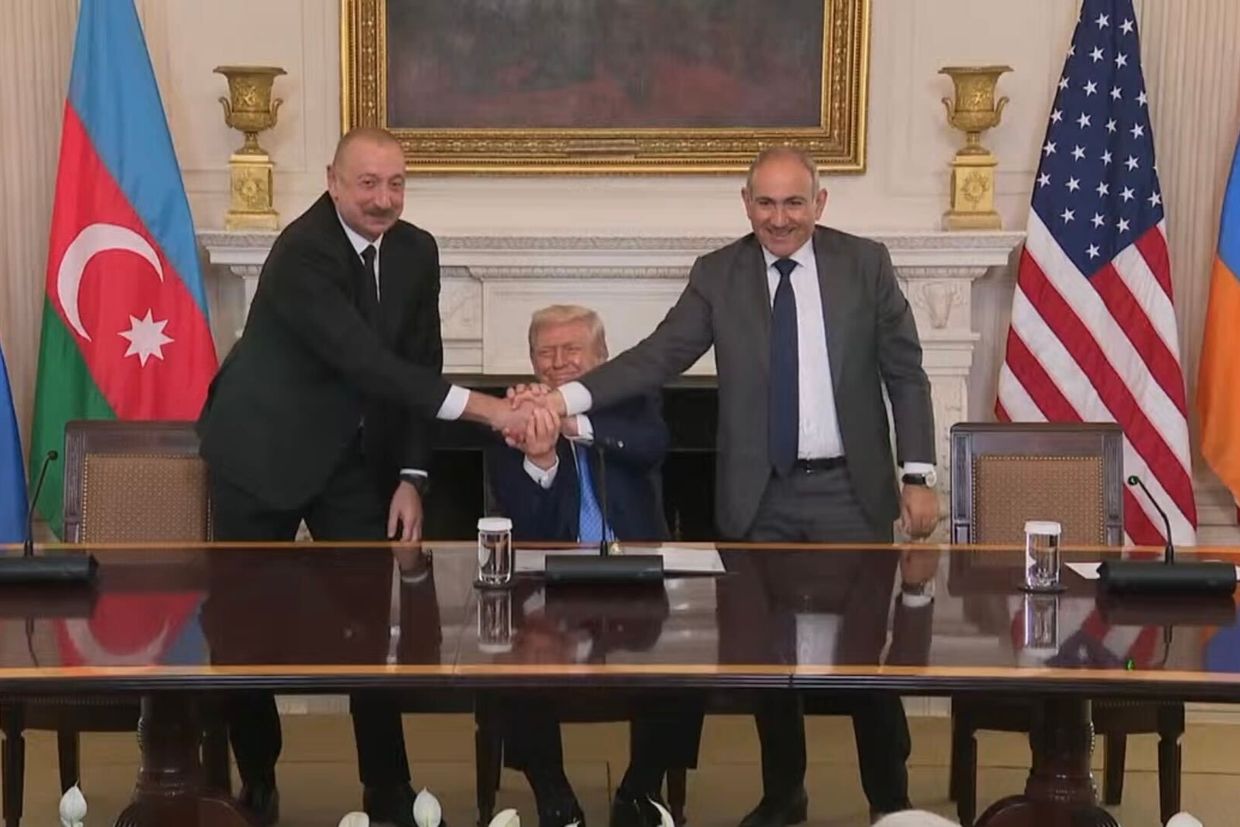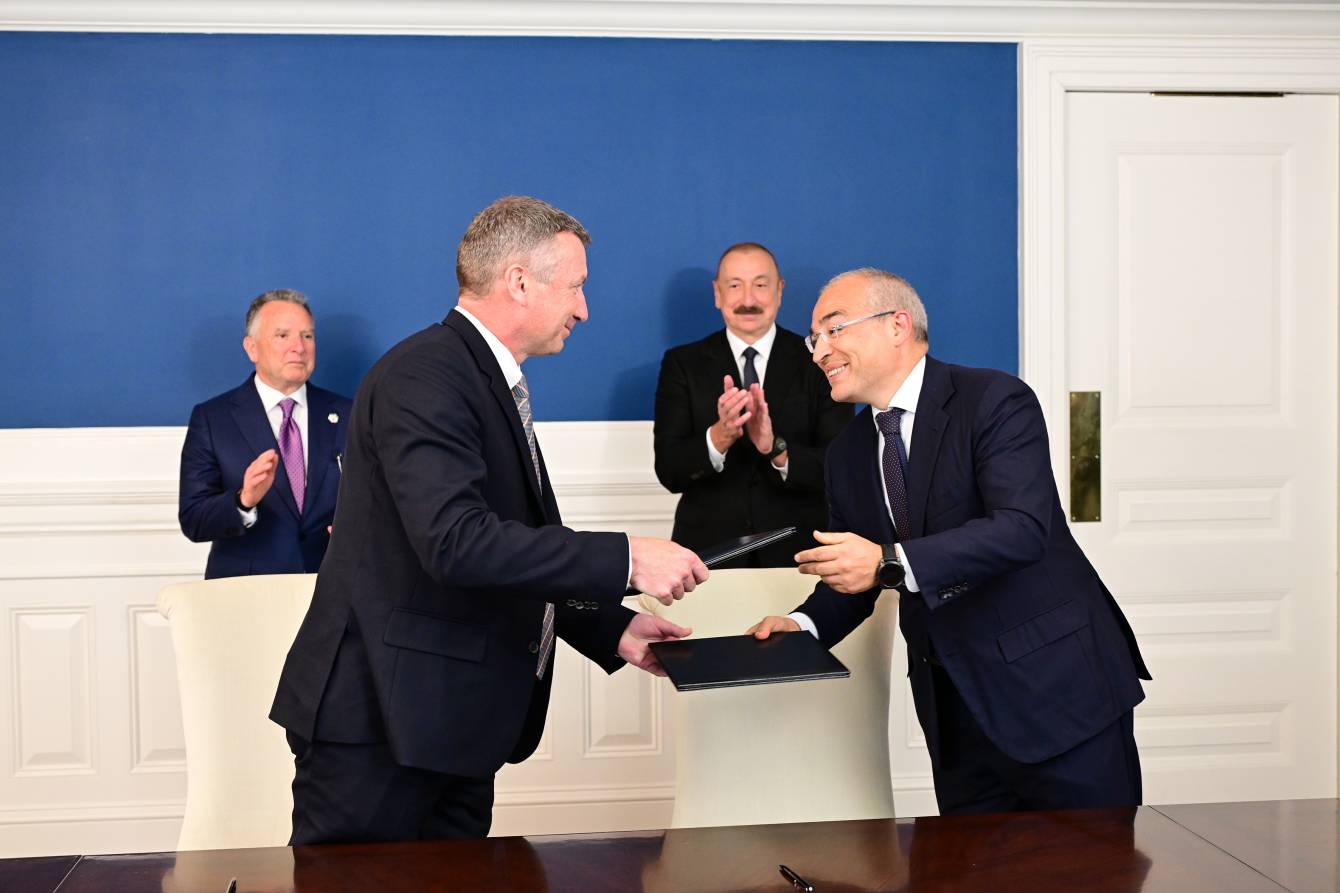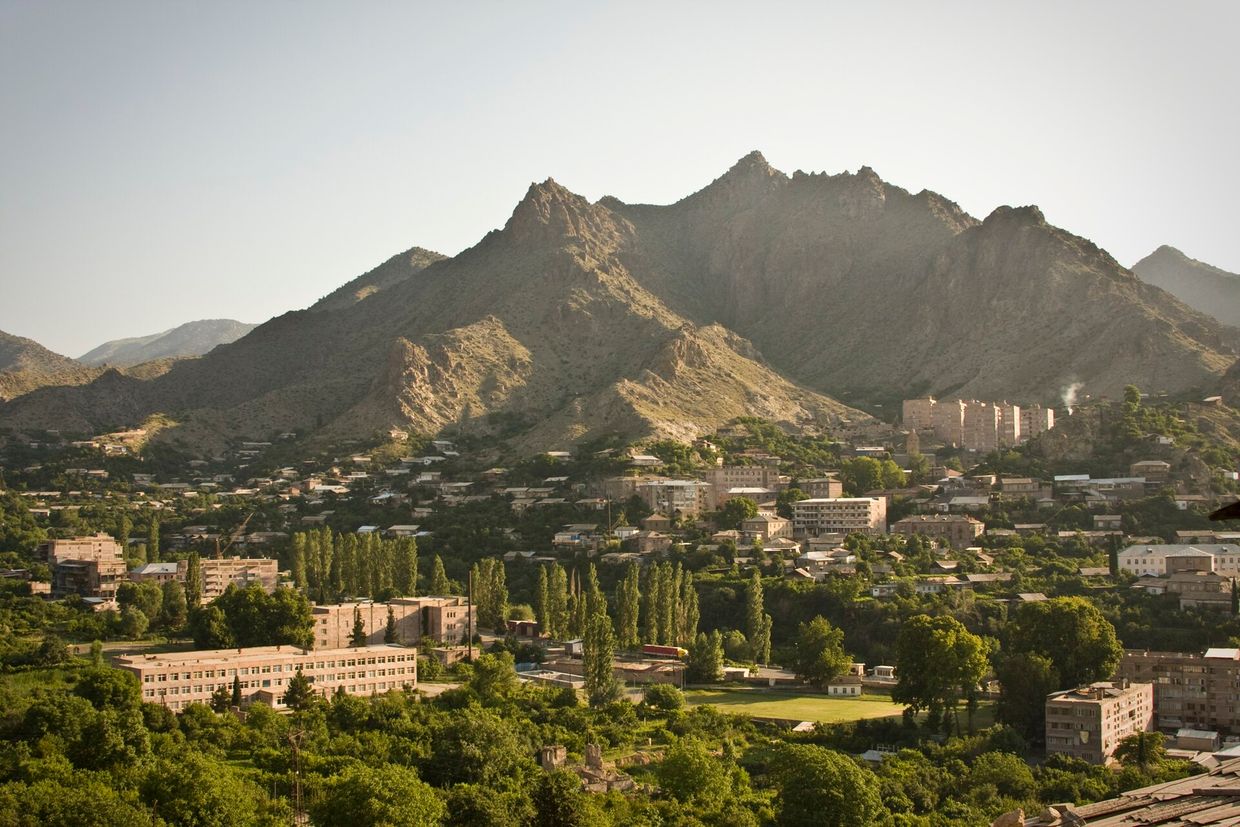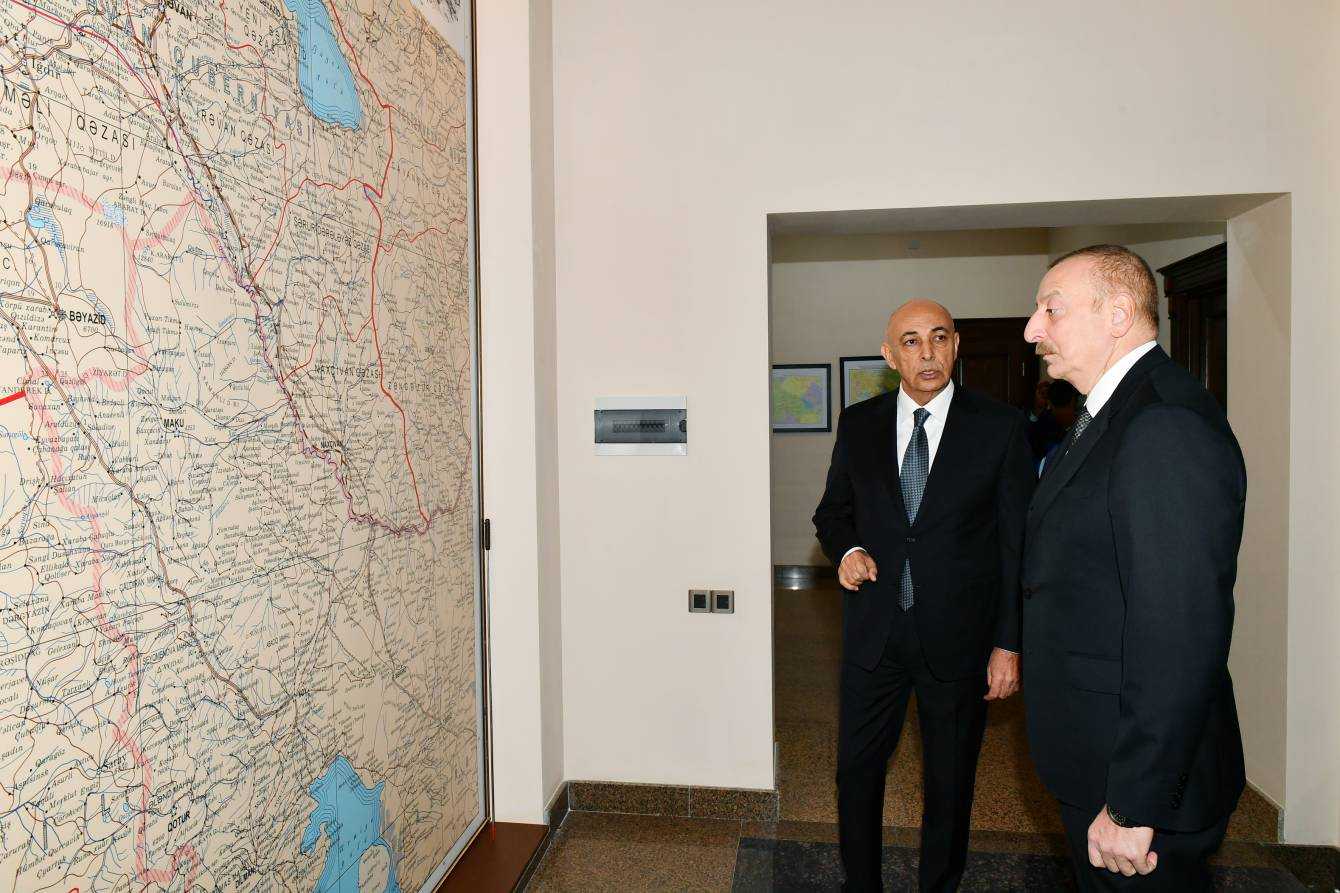Editor’s note: This article has been updated again on 11 August with new information about reactions from Russia and Iran.
Armenia and Azerbaijan took unprecedented steps toward securing peace during a historic meeting in Washington on Friday.
Armenian Prime Minister Nikol Pashinyan and Azerbaijani President Ilham Aliyev met with President Donald Trump at the White House, the first time that there has been a trilateral meeting between the leaders of Armenia, Azerbaijan, and the US in the decades since the collapse of the Soviet Union.
While an official peace deal between Armenia and Azerbaijan, which have fought two major wars and numerous violent clashes over the past 35 years, has still not been signed, Friday’s meeting brought the two sides closer to securing peace than ever before.
Here’s what you need to know about what was agreed upon in Friday’s declaration, what the initial reactions are, and what is still left on the table.
What was agreed upon?
The meeting resulted in a joint 7-point declaration between the three leaders outlining what had been agreed upon. Two agreements stand out — the initialing of a comprehensive peace deal by all three leaders, the details of which were originally agreed upon in March, and a plan to create a route connecting Azerbaijan and its exclave Nakhchivan, through Armenian territory.

The deal, titled ‘Agreement on Establishment of Peace and Inter-State relations between the Republic of Azerbaijan and the Republic of Armenia’, explicitly states in its introduction that the signatories ‘acknowledged the need to continue further actions to achieve the signing and ultimate ratification of the agreement’.
In regards to the route, which has long been a sticking point in peace talks, the agreement stipulated that ‘Armenia will work with the US and mutually determined third parties, to set forth a framework for the “Trump Route for International Peace and Prosperity” (TRIPP) connectivity project in the territory of the Republic of Armenia’.
The previous clause also addressed the route, under the guise of promoting ‘peace, stability, and prosperity in the region and in its neighbourhood on the basis of respect for the sovereignty, territorial integrity, and jurisdiction’ of the two countries.
‘These efforts are to include unimpeded connectivity between the main part of the Republic of Azerbaijan and [its exclave Nakhchivan] through the territory of the Republic of Armenia with reciprocal benefits for international and intra-state connectivity for the Republic of Armenia’.
Another longstanding sticking point, the dissolution of the OSCE Minsk Group, the body that has been primarily responsible for mediating the conflict for decades, was also resolved, with both sides signing a ‘joint appeal’ to disband the group.
The other clauses contained more intangible subjects, namely on ‘building good neighbourly relations’, recognising the ‘inviolability of international borders’, and establishing the ‘inadmissibility of the use of force for the acquisition of territory’.
In this sense, the agreement aims to pave ‘the way for closing the chapter of enmity between our two nations’.
‘We resolutely reject and exclude any attempt of revenge, now and in the future’, the clause concluded.
In addition to the primary agreement, other issues were agreed upon.
Trump mentioned that he had decided to end the decades-long restriction on US defence cooperation with Azerbaijan, which would allow US companies to sell weapons to the country, as well as the ability for Azerbaijan to more closely cooperate with the US military.
The blockage has been in place since the early 1990s, and has meant that Azerbaijan is the only post-Soviet country not to receive US aid under the Freedom Support Act passed in 1992.
In addition, both Armenia and Azerbaijan signed respective cooperation agreements with the US.
‘This is the end of 33 years of sanctions. It has been possible thanks to President Trump’, Aliyev said, according to an official readout of the signing meeting.

The Armenia–US agreement concerned three angles of partnership — the ‘Trump Route’, ‘innovative partnership in AI and semiconductors’, and ‘partnership in energy security’.
What led to this meeting?
Negotiations on ending the conflict have been ongoing since the height of the fighting in the early 1990s, largely under the OSCE Minsk Group, as well as under Russian mediation.
Diplomatic efforts increased following the end of the Second Nagorno-Karabakh War, which saw Pashinyan recognise Nagorno-Karabakh as being part of Azerbaijan, and furthered after the 2023 lightning offensive that saw the collapse of Nagorno-Karabakh and the subsequent exodus of virtually the entire ethnic Armenian population of the region.
More recently, Armenia and Azerbaijan agreed on the terms of the deal that was initialed on Friday back in March.
However, in the months that followed, Azerbaijan continued to push for preconditions, leading to concerns that the terms of the peace agreement were still in question.
At the time, the explicit contents of the agreement were not made public.
In July, Pashinyan and Aliyev held direct peace talks in Abu Dhabi, but there were no concrete outcomes.
During a media forum in the same month, Aliyev praised Trump — a video of which the US president then shared himself. Trump reposted the same video again on his Truth Social account on Friday.
Well-known for his penchant for flattery and fraternal connection, it is possible that Aliyev’s personal overture may have contributed to Trump’s increased interest in mediating the conflict.
Trump has also repeatedly expressed interest in ending wars — as well as obtaining a Nobel Peace Prize — and he and his team have been involved in a number of conflict-related negotiations since he began his second term, including India–Pakistan, Thailand–Cambodia, the DRC and Rwanda, as well as the still-unresolved peace processes between Israel and Palestine and Russia and Ukraine.
Trump acknowledged as much during his comments at the press conference on Friday.
.@POTUS: "As President, my highest aspiration is to bring peace and stability to the world. Today's signing follows our success with India and Pakistan... the Congo and Rwanda... Also, just recently, Thailand and Cambodia... We've saved a lot of lives." pic.twitter.com/l80e3K1lD1
— Rapid Response 47 (@RapidResponse47) August 8, 2025
Over the past several months, Trump and other administration officials became increasingly involved in the peace process between Armenia and Azerbaijan, particularly by floating US ownership of the controversial route, which culminated in Friday’s signing.
In late July, Trump said he had ‘worked magic’ in the peace talks between Armenia and Azerbaijan, saying ‘it’s pretty close if it’s not already done’.
What’s still unknown or unresolved?
Beyond the agreement itself, which is only a preliminary step and not the official peace deal, there are a number of unknowns and issues that were left unaddressed.
None of the three leaders elaborated on how the ‘Trump Route’ would function or how it would be overseen.
‘Armenia is also creating an exclusive partnership with the US, to develop this corridor, which could extend to up to 99 years’, Trump said, adding it could be renewed.
‘We anticipate significant infrastructure development by American companies, they are very anxious to get in, they are gonna spend a lot of money’, Trump said.
The route is intended to be managed by a US company, along with Armenian participation, but the details of how it will work in practice have not been made clear.
For example, it is unknown which company will be chosen, if security will be managed by private contractors — and where those contractors will come from — what kind of border checks will be in place, the extent of participation by Armenian border guards, how trade tariffs will be implemented and how the proceeds will be divided, and what would happen if the borders were fully opened. The exact nature and geographical location of the route have also not been made public. It is also not clear if the route will include energy links.

Beyond questions about the route, one key factor left out of Friday’s agreement was the amendment of Armenia’s constitution, which Azerbaijan says contains territorial claims. Pashinyan has said that Armenia is open to changing the constitution, but that the process requires a national vote, which may not be until the parliamentary elections in 2026. Previously, in 2024, the Armenian government said it would hold a constitutional referendum in 2027.
On Friday, Aliyev said that changing Armenia’s constitution is the remaining barrier to officially signing the peace deal.
‘As you know, the issue of territorial claims against Azerbaijan in their constitution did not allow the peace agreement to be signed today. But after these changes are made, the peace agreement can be signed at any time’.
The removal of the EU monitoring mission on the Armenian side of the border and Azerbaijani demands that Armenia drop lawsuits in international courts, both of which were reportedly included in the March agreement, were also not discussed.
Two other issues loom as the respective elephants in the room — the right for Nagorno-Karabakh Armenians to return, and the plight of Armenian prisoners held by Azerbaijan.
The 2023 Azerbaijani offensive saw some 120,000 Armenians flee Nagorno-Karabakh, most of whom remain in Armenia, although some have since moved abroad to Russia or elsewhere.
Currently, Azerbaijani authorities have acknowledged holding 23 Armenian prisoners, including former Nagorno-Karabakh state officials. Armenia has claimed that Armenian prisoners in Azerbaijan had been subjected to torture, citing evidence observed in photos published by Azerbaijan.
Videos later emerged of Trump speaking with Pashinyan about the prisoners during the meeting, along with claims he would help them be released, but no specifics were offered.
There did not appear to be discussion on the right of Nagorno-Karabakh Armenians to return to the region.
Additionally, there are still outstanding issues over border demarcation, as well parts of Armenian territory currently held by Azerbaijani troops.
When asked by the state-run outlet Armenpress for clarification on the issue, Pashinyan referred to the clause in the agreement that said ‘conditions have been created for our nations to finally embark on building good neighborly relations on the basis of the inviolability of international borders and the inadmissibility of the use of force for the acquisition of territory’. He did not provide further specifics.
Reactions from Armenia, Azerbaijan, the US, and Europe, and elsewhere
In official Armenian channels, the deal and related meetings were hailed as landmark achievements.
1/2 Today’s declaration signed by myself, President of Azerbaijan & President @realDonaldTrump who also witnessed this historic development gives confidence that we are opening a chapter of peace, prosperity, security & economic cooperation in the South Caucasus. pic.twitter.com/msR9fB1dGG
— Nikol Pashinyan (@NikolPashinyan) August 8, 2025
There will be no more war.
— Alen Simonyan (@alensimonyan) August 8, 2025
Our children will no longer be sacrificed.
There will be no corridor — the roads are opening. All roads and borders in the region will be opened.
Our economy will breathe. With each passing day, our state will become more independent and sovereign.… pic.twitter.com/6tnUPz76f3
Truly historic moment for peace!
— Ararat Mirzoyan (@AraratMirzoyan) August 9, 2025
Great & symbolic day for 🇦🇲, for the region, for the world.
Trilateral declaration signed today by PM @NikolPashinyan, @presidentaz & @realDonaldTrump at @WhiteHouse, we proclaim peace, stronger connectivity & better future for our generations. pic.twitter.com/7bMuiM0Jxd
Everyone is happy with the documents signed and statements made yesterday by @NikolPashinyan @presidentaz @POTUS @realDonaldTrump at the @WhiteHouse except Russian influence agents in Armenia & worldwide, particularly dashnaks in the United States. #FutureIsNow pic.twitter.com/rMY7Mbs3Pn
— Arsen Torosyan (@ArsTorosyan) August 9, 2025
The sentiment was echoed by Azerbaijani politicians, as well as the country’s Foreign Ministry, which said the ‘the outcomes within the Azerbaijan–Armenia normalisation process carry historic significance’.
President Ilham Aliyev: “Today is a historic day, and also because we are bringing peace.” pic.twitter.com/1D8AThs9lm
— Ilham Aliyev (@presidentaz) August 9, 2025
President İlham Aliyev Won the War — Now He Wins the Peace!!! pic.twitter.com/0bZvZ9Gw20
— Hikmet Hajiyev (@HikmetHajiyev) August 8, 2025
Historic #Azerbaijan–#Armenia summit at the @WhiteHouse.
— Aykhan Hajizada (@Aykhanh) August 8, 2025
Principled diplomacy led by President Ilham Aliyev @presidentaz brings stability, security, and prosperity to our region.
8 August 2025 🇦🇿🇦🇿🇦🇿 pic.twitter.com/pnSmAJUTHS
An official statement by the EU’s top diplomat, Kaja Kallas, said the agreements ‘mark a significant breakthrough to end decades of conflict’.
‘We strongly commend both sides and the US administration for using the momentum and making progress possible. It will now be important to ensure the timely implementation of the agreed steps, notably the signing and ratification of the peace treaty’.
Other statements across Europe and the wider world expressed similar sentiments.
Congratulations to Armenia and Azerbaijan on the bold steps taken in Washington towards peace. I commend @POTUS’s vital role in securing this breakthrough.
— David Lammy (@DavidLammy) August 9, 2025
As I told @JDVance, the UK stands ready to support peace in the South Caucasus, as both sides honour their commitments.
Pakistan welcomes the historic peace agreement signed between the Republic of Azerbaijan and the Republic of Armenia at the White House Summit under the auspices of U.S. President Donald J. Trump @realDonaldTrump
— Shehbaz Sharif (@CMShehbaz) August 9, 2025
This landmark development marks the dawn of a new era of peace,…
🇬🇪 welcomes this historic moment for 🇦🇲🇦🇿, the region and entire world! congratulating @realdonaldtrump, @presidentaz and @NikolPashinyan on this success — closing a landmark peace deal and opening a new era of stability and economic development in the region. Georgia has always…
— Irakli Kobakhidze (@PM_Kobakhidze) August 9, 2025
Turkey, Azerbaijan’s most stalwart ally, said this ‘step constitutes a highly significant development for the promotion of regional peace and stability. We commend the contributions of the US administration in the process’.
Trump and his administration, as well as other US politicians, also touted the meeting and agreements as major achievements.
— Trump Truth Social Posts On X (@TrumpTruthOnX) August 8, 2025
— JD Vance (@JDVance) August 8, 2025
Dialogue between Armenia and Azerbaijan is key to finally reaching a peace agreement that puts a lasting end to violent conflict that has plagued the region for decades. I applaud President Trump’s efforts to bring leaders together today to sign this deal and commit to a…
— Senate Foreign Relations Committee Chairman (@SenateForeign) August 8, 2025
However, there was some immediate backlash, particularly from the Armenian diaspora and associated media.
The Armenian National Committee of America (ANCA), the most prominent Armenian lobby organisation, reiterated past criticism of the deal, much of which had been expressed before the details were made public.
Armenians want peace
— ANCA (@ANCA_DC) August 9, 2025
Erasing Nagorno Karabakh is NOT peace
Normalizing ethnic-cleansing is NOT peace
Abandoning Christian holy sites is NOT peace
Forsaking Armenian hostages/POWs is NOT peace
Accepting Azeri occupation of Armenia is NOT peace
Peace at gunpoint is NOT peace https://t.co/DF5iCeDBBu pic.twitter.com/raPCo3wAoY
No peace while Armenian hostages remain captive in Azerbaijan.
— 301🇦🇲 (@301arm) August 8, 2025
Say Their Names.
Demand Their Freedom. pic.twitter.com/6WIehHTKz9
The sentiment was also repeated by some Armenian politicians, such as former Nagorno-Karabakh State Minister Artak Beglaryan.
Pashinyan and Trump have further legitimized the genocide and other international crimes committed by Aliyev against Armenians and humanity.
— Artak Beglaryan | #StopArtsakhGenocide (@Artak_Beglaryan) August 9, 2025
Justice cannot be compromised to geopolitical interests.
Trump’s empty admiration for dictator Aliyev shows his value system.
In addition, some US politicians welcomed the progress towards peace but also pushed back on the agreed upon terms.
Representative Frank Pallone, an outspoken supporter of Armenia, said that he was ‘encouraged to see the US more involved in an effort to bring Armenia and Azerbaijan together’, but added that the proposed Trump Route ‘poses problems’.
Pallone also said ‘there is no reason to provide Azerbaijan with military assistance’, as well as calling for more pressure to release Armenian prisoners.
‘The US has a moral imperative to ensure the safe, dignified, and sustainable return of displaced Armenians to their indigenous homeland of Nagorno-Karabakh’, Pallone concluded.
Russia and Iran frozen out
Perhaps two of the biggest losers from Friday’s agreement were Russia, the longtime ally and security guarantor of Armenia, and Iran, which would be bypassed by the ‘Trump Route’.
In Russian media, the agreement was covered, but largely fell below the fold and was mostly overshadowed by the news that Trump would meet with Russian President Vladimir Putin in Alaska later in August.
However, the mood from the Kremlin was clear from statements from Russian officials and in articles in state-run media.
Even ahead of Friday’s meeting, the state-run outlet RIA Novosti published an article entitled ‘Pashinyan has surrendered almost all of Armenia’s interests, expert believes’.
Kremlin propagandist Margarita Simonyan, who herself is an ethnic Armenian, repeated her past crass criticism of Pashinyan.
Pashinyan at the White House: “President Trump deserves to have the Nobel Peace Prize... we will promote for that... and hopefully you will invite us”
— Margarita Simonyan (@M_Simonyan) August 8, 2025
Not even the Antichrist's anus, just the sphincter. pic.twitter.com/ztuzZEclsV
Other propaganda accounts spread similar messages.
My friend from Armenia wrote to me at night that her country had been sold to the US. It is another loss for Russia in the Caucasus. Almost all Russians will be expelled from Armenia in the near future, and Samvel Karapetyan, who is trying to fix things and create a party, will
— Anya🐻 (@AnyafromSaintP) August 9, 2025
The staunchly hawkish media outlet Tsargrad acknowledged that the creation of the Trump Route is a ‘painful blow to Russia’s influence in the region’.
‘Now the US is confidently displacing Russia, consolidating its influence through control of the strategically important route’.
Tsargrad also criticised Pashinyan, accusing him of surrendering Armenia’s interests.
Aleksandr Bosykh, a former member of the Congress of Russian Communities, a nationalist organisation created to promote the interests of ethnic Russians abroad, said the agreements represent a significant threat to Russian influence in the South Caucasus.
‘If nothing is done, Armenia will completely break away from Russia’, Bosykh said.
Following a round of initial reactions on Friday came further official comments.
Russian Foreign Ministry spokesperson Maria Zakharova said on Saturday that the meeting ‘merits a positive assessment’ and that Russia hoped ‘this step will advance a peaceful agenda’.
However, she also issued some slightly veiled criticism of US involvement, saying that ‘until recently, Baku and Yerevan have maintained that they prefer direct dialogue without third-party mediation’.
According to Zakharova, ‘the most suitable option to resolve the problems in the South Caucasus is to search for and implement solutions developed by the region’s countries themselves’, with support from their neighbours — namely Russia, Iran, and Turkey.
She also said that the trilateral agreements between Armenia, Azerbaijan, and Russia ‘remain valid, as neither party has formally withdrawn from them’.
On Monday, Pashinyan had a phone call with Putin, during which he reportedly ‘expressed conviction that the establishment of peace between Armenia and Azerbaijan opens up new opportunities not only for Armenia and Azerbaijan, but also for all countries in the region’.
The Russian state-run media outlet TASS had a slightly different readout of the call, however, highlighting that ‘Putin noted the importance of steps that contribute to ensuring sustainable peace between Yerevan and Baku’.
‘The Russian side’s readiness to facilitate — in line with the well-known trilateral agreements at the highest level of 2020–2022 — the comprehensive normalisation of Armenian-Azerbaijani relations, including unblocking [regional transit links] in the region, was confirmed’, TASS wrote.
There were also additional comments from Yerevan’s perspective about Russia’s involvement, or lack thereof, in the process. During a press conference on Saturday, Pashinyan said he had proposed involvement in the proposed route to ‘other partners, including Russia’, but that Trump ‘was more interested’.
There was also pushback from Iran, although less pointed than from Russia.
Tehran, which maintains warm ties with Yerevan and an uneasy relationship with Baku, has regularly criticised proposals for a route through Armenia that it has said could cut the country off from the South Caucasus.
Ali Akbar Velayati, a senior adviser to Iran’s Supreme Leader Ali Khamenei, said recently that the route was a US and Israeli scheme to ‘undermine Iran’s national security and strategic ties’.
Velayati’s rhetoric became even harsher after the meeting, saying that Iran would prevent the creation of a US corridor in the Caucasus region — regardless if Moscow joins Tehran in blocking the project.
He further added that such a corridor owned by the US would ‘turn into a graveyard of the mercenaries of Donald Trump, not a route owned by the US president’.
In an official statement on Friday’s meeting, Iran said it ‘welcomes the finalisation of a peace agreement between the two countries, considering it an important step toward achieving lasting peace in the region’.
However, the statement added that it ‘expresses concern over the negative consequences of any form of foreign intervention, especially near its shared borders, that could undermine the security and lasting stability of the region’.
However, other high-level statements from Tehran were more conciliatory.
On Sunday, Iranian Foreign Minister Abbas Araghchi stated that Tehran’s ‘principled positions have been respected, but the possible presence of the American company is a cause for concern and we will continue our consultations’.
He added that the issue of the corridor ‘has been completely set aside and the discussion is about a transit road that will be built under the sovereignty and jurisdiction of Armenia, on the territory of this country’.
Separately, RFE/RL wrote on Monday that Iranian President Masoud Pezeshkian had said that the agreement between the leaders of Azerbaijan, Armenia, and the US on TRIPP had met Iran’s demands.
‘According to Iran’s plan, this issue is aimed at protecting its territorial integrity, establishing a connection with Europe, and not separating it from the north’, RFE/RL reported Pezeshkian as saying, citing the Iranian media outlet Mehr News Agency. ‘The only concern is the desire of Armenian and American companies to build this road’, Pezeshkian added.
Following the talks and the official statements, on Monday, Pashinyan also held talks with Pezeshkian, during which he emphasised that regional transport channels ‘will operate within the framework of the principles of territorial integrity, sovereignty, and jurisdiction of countries and on the basis of reciprocity’.
Pashinyan also ‘thanked’ Pezeshkian ‘for his objective assessment of the Washington agreements’.
For ease of reading, we choose not to use qualifiers such as ‘de facto’, ‘unrecognised’, or ‘partially recognised’ when discussing institutions or political positions within Abkhazia, Nagorno-Karabakh, and South Ossetia. This does not imply a position on their status.













